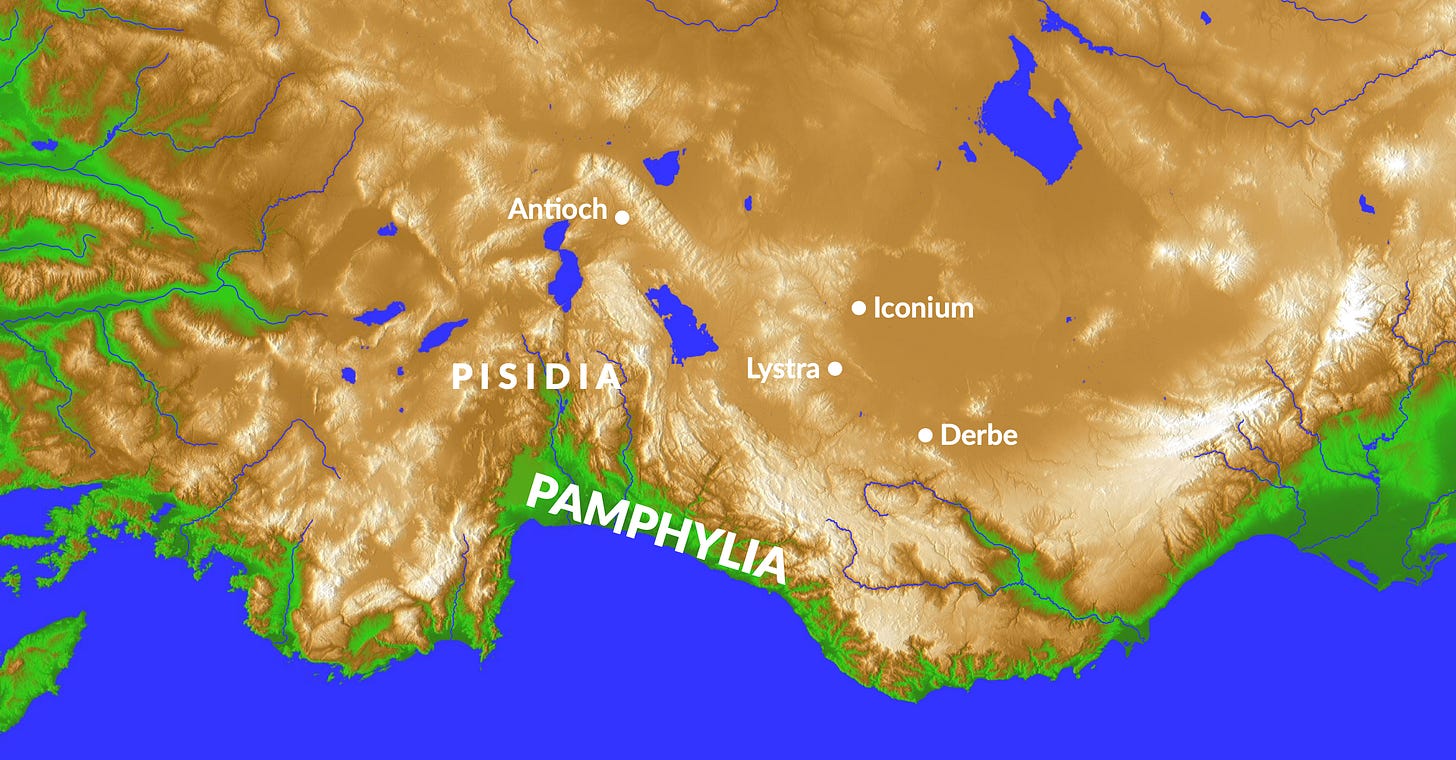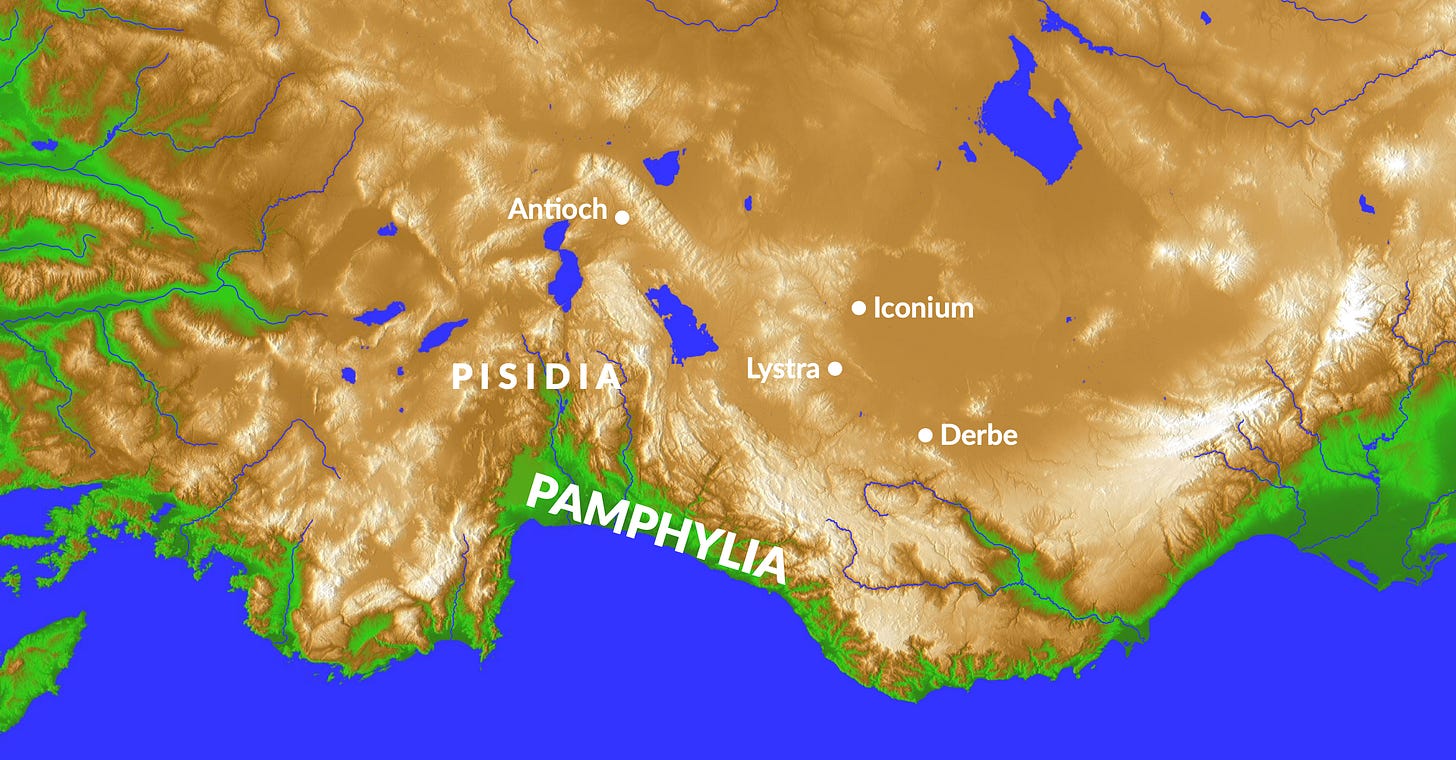Daily Scripture Reading Acts 14:1-24
There is a mentality in Christianity today that Christians should refrain from causing uproar or division. They believe the best way to do evangelism is to make non-Christians like them. In fact, some churches refuse to speak on controversial topics like the definition of marriage.
We will see in today’s passage that Paul took a different approach. He did not shy away from dissension. Perhaps modern Christianity should be eager to say things people don’t like.
The 13th chapter of Acts tells us about Paul’s sojourn in Antioch in which he began by preaching Jesus in the synagogue. The whole city came out to hear Paul, which made the Jews jealous, so they began opposing Paul and Barnabas, an act which caused Paul and Barnabas to declare they were turning to the Gentiles. After shaking the dust off their feet, they went to Iconium.
Acts 14:1 ¶ Now it happened that in Iconium they entered the synagogue of the Jews together and spoke in such a manner that a large number of people believed, both of Jews and of Greeks.
Once again Paul and his companions began in the synagogue. Both Jews and Greeks became believers.
Iconium was a city in Asia Minor, an area which today is in the country of Turkey.
Acts 14:2 But the unbelieving Jews instigated and embittered the minds of the Gentiles against the brothers.
Once again we see some Jews were opposed to Jesus.
Acts 14:3 Therefore they spent a long time there speaking boldly with reliance upon the Lord, who was testifying to the word of His grace, granting that signs and wonders be done through their hands.
Acts 14:4 But the multitude of the city was divided; and some sided with the Jews, and some with the apostles.
Notice the word “divided”. The Greek word that is translated “divided” is the word “schizo”. Schizo is the word that was used in the gospels where it tells us the temple veil was torn (schizo) in two.
In the case of the city of Iconium, the city was divided between those who believed the apostles and those who were apposed.
There is a mentality in Christianity today that Christians should try to do evangelism in a nice way so as not to cause uproar or division. Those so-called Christians want non-believers to like them. Some churches refuse to take a stand on controversial topics like the definition of marriage.
However, Paul did not shy away from controversy. Paul spoke the truth, and the truth is polarizing; therefore, Paul’s message caused division.
In the 21st century, Christians should not be bashful about proclaiming the whole truth, even when it creates an uproar.
Acts 14:5 And when an attempt was made by both the Gentiles and the Jews with their rulers to mistreat and to stone them,
Acts 14:6 they became aware of it and fled to the cities of Lycaonia, Lystra and Derbe, and the surrounding region;
Acts 14:7 and there they continued to proclaim the gospel.
Acts 14:8 ¶ And at Lystra a man was sitting who had no strength in his feet, lame from his mother’s womb, who had never walked.
Note the word “never”.
When Paul and his companions fled Iconium, they went to Lystra. It was only 22 miles / 35 km from Iconium to Lystra. That distance can be walked in one day.
Acts 14:9 This man listened to Paul as he spoke, who, when he fixed his gaze on him and saw that he had faith to be saved from being lame,
Acts 14:10 said with a loud voice, “Stand upright on your feet.” And he leaped up and began to walk.
These verses have a lot of pronouns. Verses 9 and 10 say Paul fixed his gaze on the lame man, saw that the lame man had faith to be healed, and then Paul healed the lame man with the result that the lame man got up and began to walk.
Don’t overlook the fact that the lame man had faith before he was healed. This is something we see in the gospels. Jesus healed people who had faith. There were times Jesus did not heal in certain towns or villages because the people did not believe Jesus could heal them.
Acts 14:11 And when the crowds saw what Paul had done, they raised their voice, saying in the Lycaonian language, “The gods have become like men and have come down to us.”
Acts 14:12 And they began calling Barnabas, Zeus, and Paul, Hermes, because he was the chief speaker.
In Greek mythology, Zeus was a god and the father of Hermes. Hermes was a spokesman for Zeus. Due to the healing, the crowd was convinced the gods were visiting them, and since Paul did the speaking, they assumed Barnabas was Zeus and Paul was Hermes.
Acts 14:13 And the priest of Zeus, whose temple was just outside the city, brought oxen and garlands to the gates, and was wanting to offer sacrifice with the crowds.
Acts 14:14 But when the apostles Barnabas and Paul heard of it, they tore their garments and rushed out into the crowd, crying out
Acts 14:15 and saying, “Men, why are you doing these things? We are also men of the same nature as you, proclaiming the gospel to you that you should turn from these vain things to a living God, WHO MADE THE HEAVEN AND THE EARTH AND THE SEA AND ALL THAT IS IN THEM.
In Acts 12:23 we learn that when the crowd proclaimed Herod to be a god, Herod did not refute the crowd so God put Herod to death. Paul and Barnabas did not make that mistake. They fervently denied being gods.
Acts 14:16 In the generations gone by He permitted all the nations to go their own ways;
Acts 14:17 and yet He did not leave Himself without witness, in that He did good and gave you rains from heaven and fruitful seasons, filling your hearts with food and gladness.”
Acts 14:18 And saying these things, with difficulty they restrained the crowds from offering sacrifice to them.
Acts 14:19 ¶ But Jews came from Antioch and Iconium, and after winning over the crowds and stoning Paul, they were dragging him out of the city, supposing him to be dead.
Pay attention to the fact that the Jews influenced the crowd to turn against Paul.
That was a dramatic switch. The crowds went from calling Paul a god to stoning him. The Bible does not give us a time frame on this. Did the Jews win over the crowds in a day, or did it take weeks, or perhaps even months?
This is similar to what happened to Jesus. One Sunday Jesus rode into Jerusalem on a donkey and was hailed as a king. Within a week the Jewish leaders persuaded the same crowd to demand the death of Jesus.
This illustrates the fickleness of crowds. The next time you hear accounts of mobs demanding certain actions, instead of assuming the entire mass believes in their demands, ask yourself if there might be a group of people behind the scenes swaying the crowd.
Acts 14:20 But while the disciples stood around him, he rose up and entered the city. The next day he went away with Barnabas to Derbe.
It was about 35 miles / 55 km from Lystra to Derbe. That would have taken at least two days.
Acts 14:21 And after they had proclaimed the gospel to that city and had made many disciples, they returned to Lystra and to Iconium and to Antioch,
Acts 14:22 strengthening the souls of the disciples, encouraging them to continue in the faith, and saying, “Through many afflictions we must enter the kingdom of God.”
Despite the controversy and threat to his life, after preaching in Derbe, Paul returned to Lystra, Iconium, and Antioch, cities in which there was a real chance of suffering physical harm.
Acts 14:23 And when they had appointed elders for them in every church, having prayed with fasting, they commended them to the Lord in whom they had believed.
The word “elders” is plural. We see throughout the New Testament that churches are to be ruled by a plurality of elders, not just one man.
Acts 14:24 ¶ And when they passed through Pisidia, they came into Pamphylia.
Pisidia and Pamphylia were both Roman provinces. Pamphylia was along the coast. Pamphylia was where Paul and his companions had entered Asia Minor after doing their ministry on Crete.
Many Jews were opposed to Paul’s message, but that did not stop Paul. Even though his message created division, Paul did not hesitate to speak the truth about Jesus, no matter how controversial it was.
What parts of the Christian belief system are controversial in today’s society?
What is your church’s mentality about proclaiming truths that society does not want to hear?
What can modern evangelists say to create the kind of uproar that Paul caused in Asia Minor?
Thanks for visiting Bible Mountain. If you have already joined my email list, thank you and please tell others about Bible Mountain. If you have not joined my email list yet, please do so now. In order to join, go to Bible Mountain dotcom, click on subscribe, and that will take you to a page where you can sign up. Your email address will not be sold nor given away. Once again, thanks for visiting Bible Mountain.
“Scripture quotations taken from the (LSB®) Legacy Standard Bible®, Copyright © 2021 by The Lockman Foundation. Used by permission. All rights reserved. Managed in partnership with Three Sixteen Publishing Inc. LSBible.org and 316publishing.com.”






